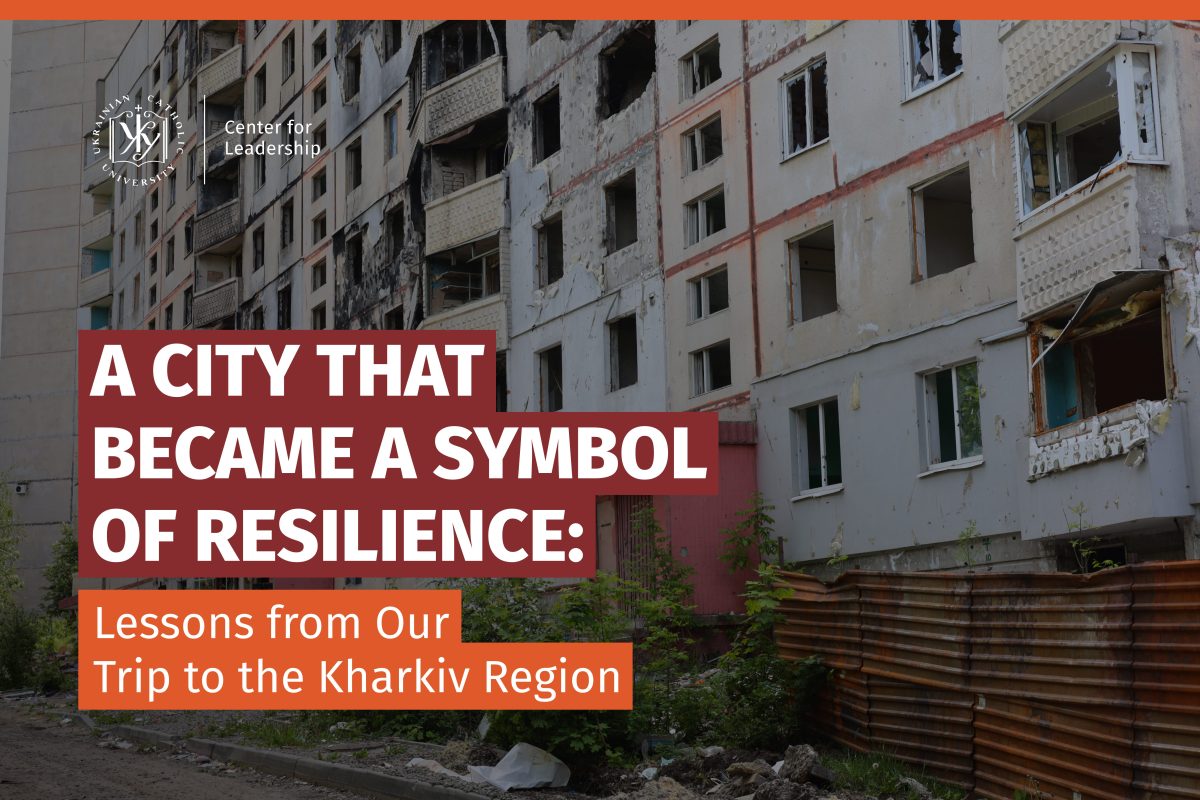
Leadership at the Frontline: Insights from Kharkiv
May 22, 2025 is a date that marked a powerful point in the Ukrainian visit of Professor Gerard Seijts, an expert in organizational behavior at the Ian O. Ihnatowycz Institute for Leadership, Ivey Business School (Canada), co-creator of the Leader Character Model, and a sincere friend of Ukraine. Together with Andrew Rozhdestvensky, Executive Director of the Center for Leadership of UCU, they traveled to Kharkiv – a city where Leadership is not theorized but lived. This is a story about that visit – a day full of meetings, conversations, trips to devastated neighborhoods, and, above all, living examples of human and community strength.
First Impressions: Reality Without Stage Sets
The trip to Kharkiv began with something no one can plan for – the immediate aftermath of a recent Russian strike. Shattered glass, scorched facades, and the silent gazes of passersby. Yet, instead of fear – motion. The city lives, adapts, and keeps going. This was the first answer to the question: what does Resilience mean during war?
Their guide in Kharkiv and its surroundings was Sergii Prokopenko – founder of “Gwara Media” and a graduate of the UCU Business School. He not only shows the city to international journalists but also documents its transformation for the future. For the Canadian researcher, this was a valuable opportunity to witness how educational experience combined with civic responsibility becomes a form of media Leadership. What Serhii Prokopenko and his colleagues do is more than journalism – it is a form of public testimony. The voice of the city, both for Ukraine and for the world.
Together with their “guide”, the guests visited Northern Saltivka – one of the most damaged residential areas in Kharkiv. Ordinary apartment blocks, like those found in hundreds of neighborhoods across the country, now bearing the “scars” of war – a signature feature of proximity to the so-called “Russian world”. But even more striking for Gerard Seijts was the visit to the village of Tsyrkuny, which is literally being rebuilt from scratch after occupation.

“When you see these places… When you realize what everyday life looks like for these people… You understand that they, and no one else, have the right to define what Resilience truly means”,
reflected the Professor.
An equally powerful experience was the visit to “Hell’s Kitchen”, one of Kharkiv’s most significant volunteer initiatives. Established at the onset of the full-scale invasion, it became a lifeline for thousands – a place where hot meals, humanitarian support, and a shared kitchen merged. Where programmers, artists, retirees, and displaced people cook side by side.

But this movement is about more than food. It represents horizontal Leadership, where each person takes on as much responsibility as they can – and does so every single day.
“It was extremely important for me to show Gerard [Seijts] this place. Because it represents bottom-up initiative. It shows what makes Ukrainians unique… and unpredictable to foreign intelligence services. And if you aim to show someone the “real” Ukraine – you can’t do it without this part of our daily life”,
recalled Andrew Rozhdestvensky.
Interview with Mayor Ihor Terekhov: Leadership That Cannot Afford Fatigue
У другій половині дня відбулася ключова подія поїздки – інтерв’ю Жерарда Сейтса з мером м. Харкова Ігорем Тереховим.
The key event of the day took place in the afternoon – Gerard Seijts’ interview with Kharkiv Mayor Ihor Terekhov. A conversation that will undoubtedly become a crucial part of the researcher’s upcoming book. Instead of dry statements – a deep, open dialogue about burdens and responsibility, about exhaustion and faith, about children and the hard decisions made daily.
Some of the questions posed:
- What does managing a frontline city during war look like from the inside?
- How does a leader stay grounded when explosions shake the night?
- What gives the strength to remain an example when breaking down isn’t an option?
- How does war affect children, and how can they be protected – mentally, not just physically?
- How has the Kharkiv community become a model – not only for Ukraine but for the world?
Head of the city spoke candidly about how decisions are made when there is no time for a “backup” plan. How essential it is to preserve not only infrastructure but also the city’s psychological fabric. And how the war has revealed the power of human connection – with buildings, stairwells, volunteers, and local businesses forming a unified living organism.
“[To me,] a Leader isn’t someone who simply gives instructions. A Leader is someone who stays with the people – no matter what happens. Even when they themselves don’t know what tomorrow will bring”,
shared the Mayor.
This conversation was a powerful testimony of Leadership – not performative or driven by slogans, but embodied in decisions and presence. And Gerard Seijts wasn’t just recording answers – he was documenting lessons. Lessons that will shape a new global understanding of Leadership in times of catastrophe.
Instead of an Epilogue: Leadership Born of Crisis
When a journey ends, we often ask: “What did we take from this experience?” But Kharkiv offers no easy answers. What Andrew Rozhdestvensky and Gerard Seijts witnessed goes beyond landscapes shaped by war. It’s the practice of Character unfolded across a city: from mayor to volunteer, entrepreneur to journalist, and soldier to civilian.The Center for Leadership of UCU and the Ivey Business School will continue to document and study these stories – in all their forms. Because a new school of Leadership is being born here. One grounded in experience, endurance, and action. And Ukraine undoubtedly has something vital to teach the world.